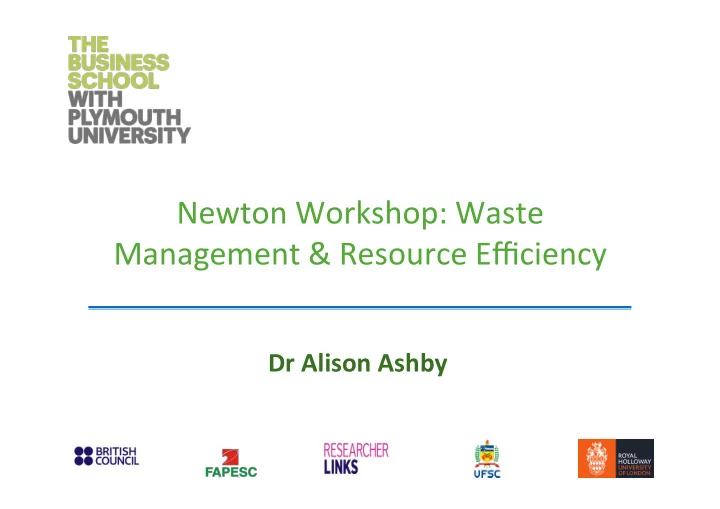

Newton Workshop: Waste Management & Resource Efficiency Dr Alison Ashby
• Tri-cameral approach to sustainability – Teaching – Opera@ons – Research
My Background • 20 years working in the UK clothing & tex@le industry • Range of roles: – Design & IT – Interna@onal sales – Commercial management – Business development • Wealth of experience: – Mee@ng customer requirements – Product & service development – Working with global factories, distributors & suppliers – Project, cri@cal path & supply chain management – Achieving business growth & profit
Current Role • Working at Plymouth Business School • Associate Dean Interna@onal • Responsible for all aspects of interna@onalisa@on for the Faculty of Business • Establishing recruitment partnerships, overseas delivery & research collabora@ons • Lecturer in Opera@ons Management • Teaching UG & PG modules in Opera@ons, Supply Chains & Sustainable Business • Programme Lead BA (Hons) Interna@onal Business • Managing all aspects, including overseas placements
Doctoral Research • Inspired by working with UK retailer, Marks & Spencer – Introduced Fairtrade & organic coZon clothing in 2006 – How to achieve a balance between economic, environmental & social performance – Social dimension underrepresented in research & prac@ce – In-depth case studies of 4 exemplar Social Environmental UK clothing SMEs Performance Performance – Use of mul@ple theore@cal lenses to Sustainability develop enhanced SSCM framework Economic Performance
Theore@cal Lenses Theoretical Lens Foundation Alignment with Literature Resource Based View Strategy/strategic management GSCM, processes, resource efficiency, RL, EM, recycling, reuse, DfE, knowledge sharing & integra@on of external resources Social Network Theory Social sciences/social psychology SCM, Supply Chain Orienta@on, EM, CLSC, product stewardship (RL, recycling, reuse) Social Capital Theory Social sciences Supply chain rela@onships, social resources, CSR, Fairtrade, supply management (economic & natural capital) Alignment of Lenses and Reviewed Literature RBV Social Network Theory Social Capital Theory Strategic resources: Organisa@onal outcomes: Resources embedded in social Valuable structure of rela@onships • Rare Rela@onal Beliefs • • Inimitable Strength of @es Trust • • • Non-subs@tutable Trust Norms • • • Social meanings Rules • • Networks Socially complex resources • Structural Structural Content flows Tacit resources • PaZern of connec@ons • Embeddedness Rela@onal-cogni@ve Personal • Shared meaning/ • understanding Interac@on between the Theore@cal Lenses
How a firm approaches profit, growth and Social Network Dimensions commerciality and how they align with firm specific commitments/purpose Rela@onships • Embeddedness • How a firm structures its supply chain - Connec@ons encapsulates new and/or local supply chains, • and preserva@on and posterity Social Capital Dimensions Social Capital Dimensions Trust & respect Social structure • • Beliefs Personal • • Shared meaning Rela@onships Culture • • Principles People Specific owner-manager principles & commitments Shared principles Prac>ce Trus`ul, respec`ul rela@onships Making a difference ‘Human’ elements – employees & suppliers Firm specific prac@ces – Emo@ons/personal environmental & social interac@ons/friendships Level of eco literacy Shared understanding Product – design/development, RBV Dimensions lifecycle, authen@city Resources • Use & development of resources – Tacit skills • efficient, effec@ve, mindful Embeddedness • Innova@on •
Key Publica@ons Ashby, Leat & Hudson Smith (2012) 'Making Connec@ons: a review of supply chain management and sustainability literature', Supply Chain Management: an Interna4onal Journal, Volume 17, Issue 5, pp. 497-516 Ashby (2016) ‘From Global to Local: Reshoring for Sustainability’, Opera4ons Management Research
Current Research Focus • Closed Loop Supply Chains – Mechanism to maximise resource u@lisa@on & minimise waste – Major challenges in their global implementa@on – Need for a more holis@c, systems-based approach • Reshoring for sustainability – How ‘local’ supply chains can enable SSCM – Role of supplier rela@onships – Visibility & transparency
Areas for Collabora@on • How to embed the social dimension in sustainability research & prac@ce – Appropriate theore@cal lenses • How to design the supply chain for sustainability – Implemen@ng closed loops • Build on exis@ng research links in Brazil – Opportunity for research into sustainable energy supply chains
Dr Alison Ashby Lecturer in Opera@ons Management Associate Dean Interna@onal Faculty of Business Plymouth PL4 8AA Telephone: +44 (0)1752 585664 Email: alison.ashby@plymouth.ac.uk
Recommend
More recommend